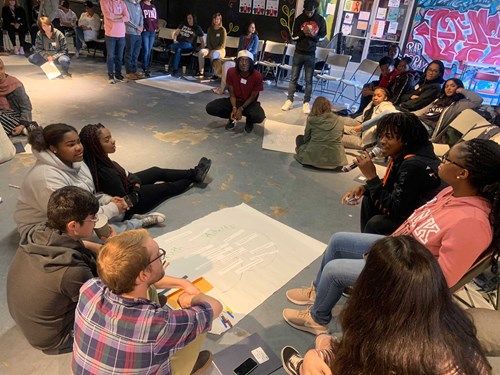As a department within University Outreach and Engagement, the Community Evaluation and Research Collaborative (CERC) supports university-community partnerships for research and evaluation that are collaborative, participatory, empowering, systemic, transformative, and scholarly.
Collaborative
At CERC, we believe that the challenges facing humanity in the 21st century require a positive vision of the future, collaboration across broad sectors of society, and a determination to persevere in the face of daunting challenges. To foster collaboration between campus and community, we help to build university-community partnerships for research and evaluation. See the Services page for details.
Participatory
CERC supports community-driven approaches to social problem solving. Being community driven means that the people most affected by a target problem are deeply involved in defining it, developing and testing strategies to address it, establishing the criteria by which the success of efforts to address it are assessed, and judging the success of efforts to ameliorate it. To foster collaborative approaches to problem solving we use participatory approaches to research and evaluation.
Empowering
At the individual level, empowerment is “a process by which individuals gain mastery and control over their lives, and a critical understanding of their environment” (Zimmerman et al., 1992). Through the use of participatory, collaborative approaches to evaluation and research, CERC strives to empower individuals, organizations, and communities to gain mastery over their circumstances. Using the tools of research, evaluation, and systems approaches, individuals, organizations and communities can gain deeper understandings of the dynamics of the situations they are confronting and develop, test, and evaluate evidence-informed strategies for improving them.
Systemic
Many of the challenges we face in the early 21st century are not isolated problems, but what systems theorist Russell Ackoff (1999) referred to as “messes”—complex dynamic systems of problems that interact and reinforce each other over time. Because the linear mechanistic models of the 20th century are ill-suited to dealing with messes, we promote a different approach to engagement, inquiry, and problem solving called Systemic Engagement (SE). SE involves universities as partners in systemic approaches to social problem solving. See the Learning Resources page for details about systemic approaches.
Transformative
Transformative partnerships are partnerships that result in significant second-order changes. Whereas first order changes involve adjustments to existing systems and structures, second order changes involve viewing situations in new ways, understanding how the structures of existing systems generate the problems of concern, and shifting those structures to produce better results. At CERC we use the tools of research, evaluation, and systems approaches to stimulate new thinking, develop innovative strategies, and assess their effects.
Scholarly
At CERC, being scholarly means grounding our work in the latest scholarship and evidence and combining university-generated knowledge with community generated knowledge to co-create deeper understandings of complex issues and effective approaches to addressing them.








